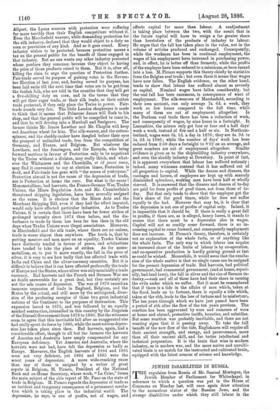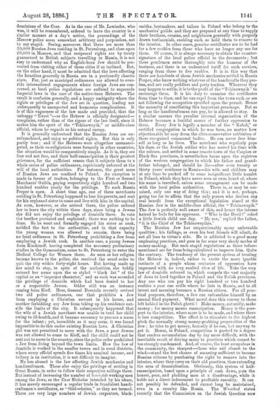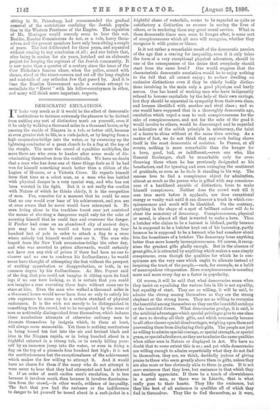JEWISH DISABILITIES IN RUSSIA. T HE expulsion from Russia of Mr.
Samuel Montague, the Jewish Member of Parliament for Whitechapel, in reference to which a question was pat in the House of Commons on Monday last, will once again draw attention to the anomalous status of the Russian Jews, and the strange disabilities under which they still labour in the dominions of the Czar. As in the case of Mr. Lewisohn, who was, it will be remembered, ordered to leave the country in a similar manner at a day's notice, the proceedings of the Moscow police seem somewhat arbitrary and purposeless, not to say stupid. Seeing, moreover, that there are more than 30,000 Russian Jews residing in St. Petersburg, and close upon 20,000 in Moscow, and that reciprocal rights are by treaty guaranteed to British subjects travelling in Russia, it is not easy to understand why an English-born Jew should be pre- vented from visiting either of these cities if so inclined. But, on the other hand, it must be admitted that the laws affecting the Israelites generally in Russia are in a profoundly chaotic state. For, just as municipal ordinances are allowed to over- ride international engagements where foreign Jews are con- cerned, so local police regulations are suffered to supersede Imperial laws in the case of the native-born Hebrews. The result is confusion generally, and a happy ambiguity where the rights or privileges of the Jew are in question, leading not unfrequently to unexpected and humorous complications. It is of this vagueness of the law made and provided, that the unhappy " Ewrei "—as the Hebrew is officially designated— complains, rather than of the rigour of the law itself, since it makes him the sport of the "Tchinownyik," or middle-class official, whom he regards as his natural enemy.
It is generally understood that the Russian Jews are un- enfranchised, and enjoy no political rights. But this is only partly true ; and if the Hebrews were altogether unemanci- pated, as their co-religionists were formerly in other countries, the situation would be comparatively simple. As it is, they are free and not free, and their half-emancipation is their greatest grievance, for the sufficient reason that it subjects them to a whole series of police ordinances, capriciously enforced at the will of the local authorities. For instance, the great mass of Russian Jews are confined to Poland. An exception is made in favour of traders, belonging to the First or Second Merchants' Guilds, paying respectively eight hundred and two hundred roubles yearly for the privilege. To such Russia Proper is open. A short time ago, one of these merchants residing in St. Petersburg happened to lose his parents, and sent for his orphaned sister to come and live with him in the capital. As soon, however, as she arrived there, the police ordered her to leave the city within three days, since being a Jewess she did not enjoy the privilege of domicile there. In vain the brother protested and explained ; there was nothing to be done. So he went and formally engaged his sister as cook, notified the fact to the authorities, and in that capacity the young woman was allowed to remain, there being no local ordinance in St. Petersburg prohibiting a Jew from employing a Jewish cook. In another case, a young Jewess from Kischineff, having completed the necessary preliminary studies in the Gymnasium, came to St. Petersburg to enter the Medical College for Women there. As soon as her religion became known to the police, she received the usual order to quit the city within forty-eight hours. But having made up her mind to stay, in spite of the authorities, she boldly entered her name upon the so styled " black list " of the capital as an " improper character," and as such was accorded the privilege of domicile which had been denied to her as a respectable Jewess. Odder still was an instance coming from Kieff. Here, General Drenteln recently revived two old police ordinances, one that prohibits a Jew from employing a Christian servant in his house, and another forbidding any Jew from taking up his residence out- side the limits of the city. It subsequently happened that the wife of a Jewish merchant was unable to tend her child owing to ill-health, and it became necessary to procure a nurse for the infant ; yet, incredible as it may seem, it was found impossible to do this under existing Russian laws. A Christian girl was not permitted to serve with the Jews, a poor Jewess was not allowed to come to Kieff, and the child could not be sent out to nurse in the country, since the police order prohibited a Jew from living beyond the town limits. How the law of domicile is worked in the smaller towns and in rural districts, where every official spends five times his nominal income, and bribery is an institution, it is not difficult to imagine.
No less abused is the law affecting Jewish mechanics and handicraftsmen. These also enjoy the privilege of settling in Great Russia, in order to follow their respective callings there.
But instead of increasing the number of bonds fileworking men among the Jews, as the Czar Nicholas intended by his ukase,
it has merely encouraged a regular trade in fraudulent handi- craftsmen's certificates, or "Gild-scheine," as they are termed. There are very large numbers of Jewish carpenters, black-
smiths, bootmakers, and tailors in Poland who belong to the mechanics' guilds, and they are prepared at any time to supply their brothers, cousins, and neighbours generally with properly drawn testimonials, enabling such as hold them to remove to the interior. In other cases, genuine certificates are to be had for a few roubles from those who have no longer any use for them. Of course, it is always necessary to obtain the counter- signature of the local police official to the documents ; but these gentlemen enter thoroughly into the humour of the business, and there is an understood tariff for such services, ranging from three to five roubles. It is in this way that there are hundreds of sham Jewish mechanics settled in Russia Proper, who know nothing whatever of the handicrafts they pro- fess, and are really peddlers and petty traders. Wherever they may happen to settle, it is to the profit of the "Tchinownyik" to encourage them. It is his duty to examine the certificates from time to time, and he can expel from the town such as are not following the occupation specified upon the permit. Hence the necessity of conciliating this important personage. But so long as the handicraftsman can pay, he is allowed to stay. In a similar manner the peculiar internal organisation of the Hebrew becomes a fruitful source of further oppression to them. Every Jew is legally a member of the " Kahal," or certified congregation in which he was born, no matter how objectionable he may deem the ultra-conservative rabbinism of these recognised communal bodies. He can never free him- self as long as he lives. The merchant who regularly pays his dues, or the Jewish soldier who has served his time with the colours, and settled in some remote town of the Caspian or Black Sea provinces, is nevertheless borne upon the registers of the western congregation to which his father and grand- father belonged, and should he die—after even twenty or- thirty years' residence in Russia—his wife and children may at any time be packed off to some insignificant little hamlet in Poland, which they have never seen or even heard of, where his name is inscribed, unless some arrangement can be made with the local police authorities. There is, as may be sur- mised, only one way of doing this ; and it is not, perhaps, going too far to affirm that the only person who derives any real benefit from the exceptional legislation aimed at the Russian Jew is the middle-class official, the " Tchinownyik." The Jew is perfectly well aware of this, and hence the intense hatred he feels for his oppressor. " Who is the Devil ?" asked, a little Jewish child one day. " My son," replied the father, "it is the Chief of the Tchinownyikes."
The Russian Jew has unquestionably many unloveable qualities ; his failings, as even his best friends will admit, do not all lean to virtue's aide. He is addicted to a good many unpleasing practices, and goes in for some very shady modes of money-making. But such stupid regulations as those before- mentioned are far from being calculated to improve him. Quite the contrary. The tendency of the present system of treating, the Hebrew is, indeed, rather to excite the more ignoble instincts of a people whom centuries of oppression have impressed with no very exalted view of life. Take the very law of domicile referred to, which compels the vast majority of Jews to herd together in Poland and the Polish provinces. Any one who can pay his eight hundred or two hundred roubles a year can settle where he lists in Russia, and to all intent and meaning becomes a Russian citizen. For all prac- tical purposes, therefore, a Jew can enfranchise himself by an annual fixed payment. What moral does this convey to those• left behind in the Polish ghetti ? Make money, naturally, make• money ; for money means emancipation. Money is the pass- port to the interior, where more is to be made, and where there- is less competition. The effect is to stimulate to the highest pitch the normally strong money-grubbing propensities of the Jew ; he tries to get money, honestly if he can, but anyway to
get it. Hence, in Poland, competition is pushed to a degree that renders accumulation day by day more difficult, with the inevitable result of driving many to practices which cannot be
too strongly condemned. And, of course, the least scrupulous in the community, the sharpest—those who sail closest to the
wind—stand the beat chance of amassing sufficient to become Russian citizens by purchasing the right to remove into the interior, where they carry on their old practices, thus extending
the area of demoralisation. Obviously, this system of half- emancipation, based upon a principle of cash down, puts the honest, poor, and plodding man at a disadvantage, while it holds out a direct inducement to profitable rascality. It can not possibly be defended, and cannot long be maintained, even in a country like Russia. The Woschod stated recently that the Commission on the Jewish Question now
sitting in St. Petersburg, had recommended the gradual removal of the restrictions confining the Jewish popula- tion to the Western Provinces of the Empire. The expulsion of Mr. Montague would scarcely seem to bear this out. Besides, Russian Commissions do not, as a rule, hurry them- selves, and the present members have only been sitting a couple of years. The last deliberated for three years, and separated without coming to any conclusion at all ; and one before that, after being in session for six years, hatched out an elaborate project for keeping the registers of the Jewish community. It is now more than a quarter of a century since the issue of the Czar Nicholas's famous ukase, when the police, armed with shears, stood at the street-corners and cut off the long ringlets and coat-tails of any orthodox Jew that passed by. And it is time the Russian Government made a serious attempt to assimilate the " Ewrei " with his fellow-countrymen in other, and many will think more important, respects.




































 Previous page
Previous page